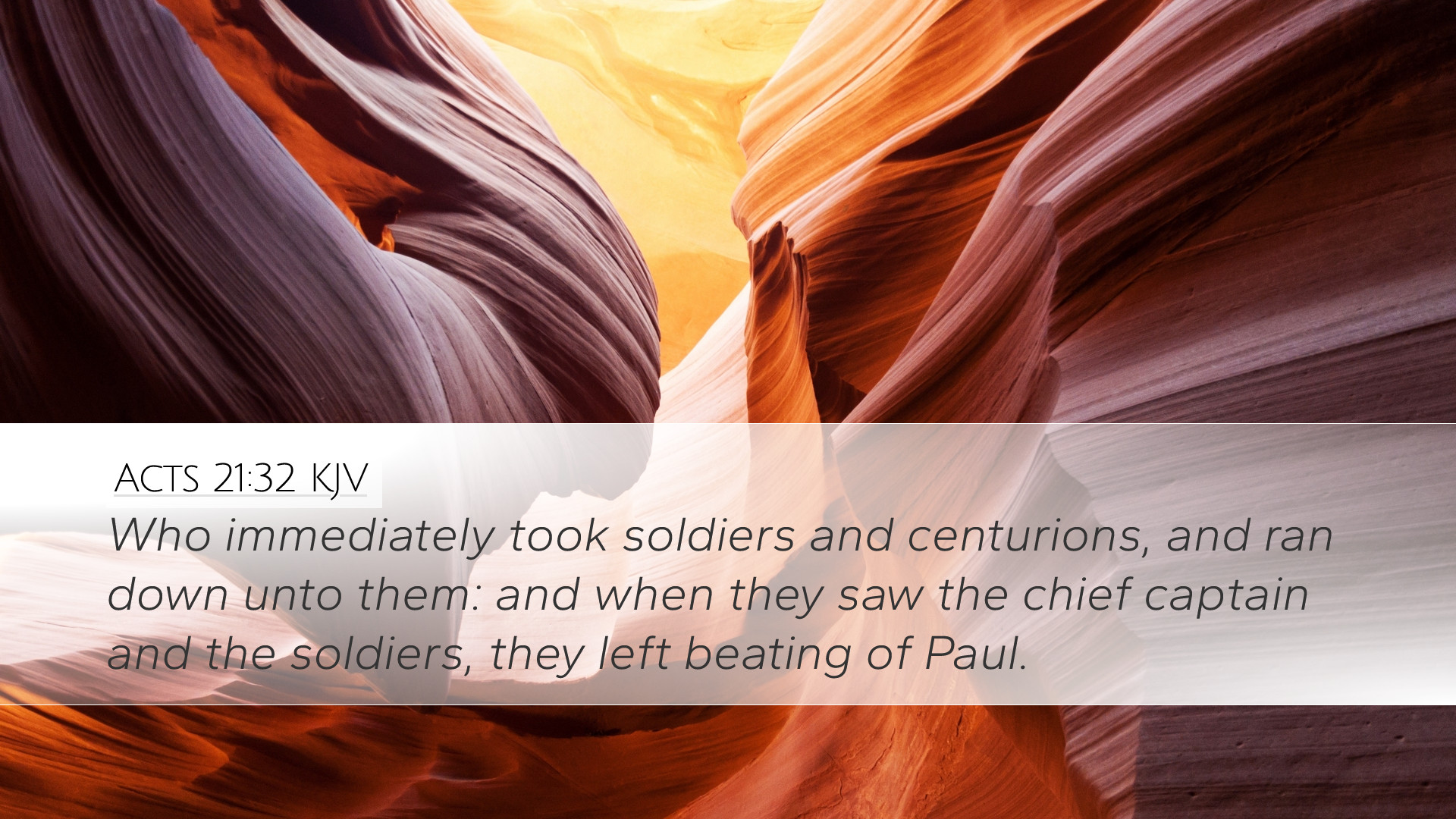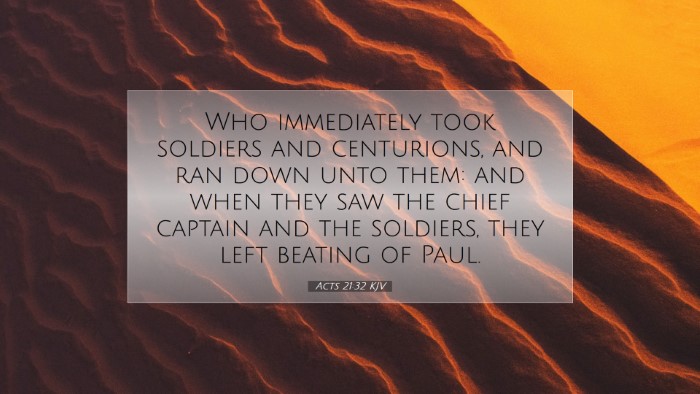Commentary on Acts 21:32
Acts 21:32 (KJV): "Who immediately took soldiers and centurions, and ran down unto them: and when they saw the chief captain and the soldiers, they left beating of Paul."
Introduction
This verse falls within the narrative of Paul's journey, highlighting a critical moment where intervention occurs to prevent potential harm to Paul. As we unpack this verse, we will draw insights from esteemed public domain commentaries by Matthew Henry, Albert Barnes, and Adam Clarke, with a focus on their theological and pastoral implications.
Contextual Background
Before diving into the specifics of Acts 21:32, it is essential to consider the broader context of Paul's ministry and the reception he received in Jerusalem. Paul had returned to Jerusalem despite warnings about the dangers awaiting him. His willingness to face persecution represents a profound aspect of his character and mission.
Matthew Henry's Perspective
Matthew Henry emphasizes the role of divine providence in Paul's circumstance. He notes that Paul's suffering was not only anticipated but also divinely orchestrated to fulfill God's purposes. Henry points out that the intervention of Roman authorities was a critical moment that reflects God's provision for Paul amidst danger.
- Divine Intervention: Henry comments on the importance of the Roman centurions and soldiers arriving at the scene, recognizing it as a moment of divine intervention that illustrates how God can utilize secular powers for His purposes.
- Lessons in Suffering: From this event, Henry suggests, Christians are reminded of their calling to endure suffering for Christ's sake and how God often makes a way for His servants, even in perilous times.
Albert Barnes' Insights
Albert Barnes provides a detailed examination of the complexities surrounding Roman law and public order. He underscores the responsibilities of the chief captain in maintaining order, noting that the captain's quick response to gather soldiers indicates the severity of the situation.
- Maintaining Order: Barnes explains that the chief captain's action was not just a reaction to a riot but a critical duty to prevent public disorder, showcasing the political dynamics at play.
- Paul's Right as a Roman Citizen: While not explicitly mentioned in this verse, Barnes points to the implications of Paul’s Roman citizenship, which would be significant as the narrative unfolds, granting him rights that were pivotal for his defense.
Adam Clarke's Commentary
Adam Clarke approaches this verse with a focus on the sociopolitical implications of the event. Clarke thoroughly explains the roles of the chief captain and the soldiers, describing their military discipline and the necessity of rapid response in tumultuous situations.
- Understanding Public Sentiment: Clarke brings attention to the hostile environment surrounding Paul, reflecting on the Jews' fervent reaction influenced by misinformation regarding Paul's character and teachings.
- Faith in Action: Clarke highlights Paul's composure amidst chaos, suggesting that true faith is often demonstrated in steadiness and trust in God's plan, even when besieged by trials.
Theological Implications
This verse encapsulates several significant theological themes that are crucial for pastors, students, and scholars:
- Divine Sovereignty: The swift intervention of the Roman soldiers serves as a testament to God's sovereign control over human affairs, providing assurance that God’s providence is active, even when it is not visible.
- The Role of Authority: This incident underlines the complexity of human authority and its implications for believers. It encourages an understanding of how believers are to navigate conflicts with authorities.
- Perseverance in Faith: Paul's willingness to endure hardship for the sake of the Gospel highlights the call for Christians to sustain their witness through trials, reaffirming their commitment to Christ.
Practical Applications
For those involved in pastoral ministry or theological training, Acts 21:32 invites practical reflection on how believers respond under pressure:
- Embrace Divine Deliverance: Just as Paul experienced timely rescue, believers are encouraged to trust that God will provide help during trials.
- Be Prepared for Conflict: Understanding the nature of spiritual warfare can prepare believers to stand firm in faith when facing hostility.
- Engage with Authority Wisely: The relationship between Christians and authorities is complex; believers are called to engage respectfully and wisely, trusting in God’s ultimate authority.
Conclusion
Acts 21:32 is a powerful reminder of the complexities surrounding Paul’s ministry, the roles of divine providence, and the nature of human authority. The commentaries of Henry, Barnes, and Clarke offer rich insights that enhance our understanding of this biblical text and its implications for Christians today. As we navigate our paths, may we draw strength from God's unwavering sovereignty and be emboldened to witness for Christ, even in challenging circumstances.


